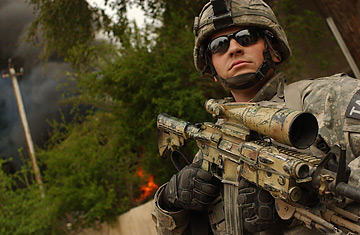
A U.S. soldier patrols the Ghazaliya neighborhood of Baghdad, March 2007
Three U.S. Army companies currently live on small bases in the neighborhood, and a fourth is setting up shop. Delta Company, 2-12 Cavalry, operates in the Sunni insurgent stronghold of south Ghazaliya, and in recent weeks it has seen the constant drumbeat of sniper fire, roadside bombs and firefights with insurgents ease significantly.
The area remains dangerous, but safe enough for Captain Jon Brooks to begin sending his men out on foot patrol as much as possible. Last week Brooks and his men walked to a meeting at one of the battalion's other outposts in Ghazaliya.
"I kind of just want to prove a point," he said, "that it's so frickin' close you can easily walk there."
In line with the overarching strategy of the surge, Brooks wants his men walking around like street cops on a beat.
"All an insurgency needs to exist, survive, flourish — and eventually possibly succeed — is the acquiescence of the population," Brooks says. He notes several reasons residents supported the insurgency in Ghazaliya, including a political or religious opposition to the U.S. presence and an unwillingness on the part of Sunnis to submit to a Shi'ite-dominated government.
But "just like a blanket overlying all of these reasons, the primary reason for complicity is fear," Brooks adds. U.S. commanders hope that a constant presence of Americans in neighborhoods such as Ghazaliya, rather than simply driving through, will make it harder for insurgents to maintain their grip on the population. Says Brooks, "I'm going to specifically target the enemy's intimidation campaign."
To that end, the captain and his men are talking constantly to residents about everything from the price of propane to whether they feel safe in their homes. "I'm trying to find the dude who knows what's going on on the street," Brooks said. "This is what the troop surge allows me to do."
After his first day walking house-to-house, Brooks said he had gathered no intelligence about the insurgency in Ghazaliya. But that wasn't the point. "I'm not looking for an immediate payoff," he said. "[I'm looking] to influence the population so that they aren't complicit with the insurgency, so if they do have good information, they'll call me."
On that foot patrol, residents told American soldiers that they were relieved to have U.S. forces in the neighborhood. An Iraqi who lives in the neighborhood and reports for TIME confirmed that the sentiment seems genuine rather than simply saying what the Americans want to hear.
In fact, there seems to be more hostility in Ghazaliya's Sunni districts towards the Shi'ite-dominated Iraqi security forces than mistrust of the U.S. Residents told Brooks stories of fear and intimidation — a mother who drives her son everywhere for fear that a lone young man with an obviously Sunni first name will disappear at a checkpoint; an old man who accused the Iraqi Army of murdering his son; a shopkeeper who said children swarm around American soldiers on patrol but scatter at the approach of the Iraqi Army.
Sunni civilians hope the expanded U.S. presence, in fact, will rein in the Iraqi security forces. One young man, noting that many Iraqi soldiers are loyal to Shi'ite militia, pleaded with a U.S. sergeant: "You need to keep an eye on them."
The fact that Americans now live and work in the same small bases as their Iraqi counterparts allows for more oversight, but the Iraqis run operations independently and their every move is not tracked by U.S. soldiers. The sergeant answered that unless residents approach Americans when they feel mistreated by the Iraqi Army, the U.S. forces simply won't know.
The current Iraqi battalion commander in south Ghazaliya, Col. Jabar, has a much better reputation here than his predecessor. He comes from Basra, whereas his predecessor, Col. Sabah, grew up in a Shi'ite neighborhood adjacent to Ghazaliya. Both men are Shi'ites, but Jabar has no personal stake in Ghazaliya.
"They're not from the area," said Maj. Jim Orr, who heads the American team that advises Col. Jabar and his staff, "so they don't have any personal bias against the people or the community."
As Capt. Matthew Koehler, another U.S. advisor, put it, "Col. Jabar wants to meet the people and gain their trust. Col. Sabah just wants to kill terrorists."
Col. Jabar's battalion is set to leave the area soon, to be replaced by a unit run by one of his protgs. But beyond the fairness and effectiveness of individual Iraqi units is the political reality of a Shi'ite-dominated government that sends Shi'ite soldiers, some of dubious affiliation, to operate in dangerous Sunni neighborhoods. Ghazaliya is calmer now because Sunnis are putting their faith in the U.S. military, a force destined to leave as soon as it possibly can. When the Americans are gone, however, the mistrust between Iraqis will remain.
